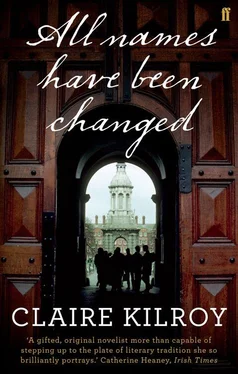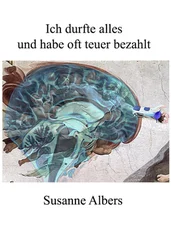Claire Kilroy - All Names Have Been Changed
Здесь есть возможность читать онлайн «Claire Kilroy - All Names Have Been Changed» весь текст электронной книги совершенно бесплатно (целиком полную версию без сокращений). В некоторых случаях можно слушать аудио, скачать через торрент в формате fb2 и присутствует краткое содержание. Год выпуска: 2010, Издательство: Faber & Faber, Жанр: Современная проза, на английском языке. Описание произведения, (предисловие) а так же отзывы посетителей доступны на портале библиотеки ЛибКат.
- Название:All Names Have Been Changed
- Автор:
- Издательство:Faber & Faber
- Жанр:
- Год:2010
- ISBN:нет данных
- Рейтинг книги:5 / 5. Голосов: 1
-
Избранное:Добавить в избранное
- Отзывы:
-
Ваша оценка:
- 100
- 1
- 2
- 3
- 4
- 5
All Names Have Been Changed: краткое содержание, описание и аннотация
Предлагаем к чтению аннотацию, описание, краткое содержание или предисловие (зависит от того, что написал сам автор книги «All Names Have Been Changed»). Если вы не нашли необходимую информацию о книге — напишите в комментариях, мы постараемся отыскать её.
All Names Have Been Changed — читать онлайн бесплатно полную книгу (весь текст) целиком
Ниже представлен текст книги, разбитый по страницам. Система сохранения места последней прочитанной страницы, позволяет с удобством читать онлайн бесплатно книгу «All Names Have Been Changed», без необходимости каждый раз заново искать на чём Вы остановились. Поставьте закладку, и сможете в любой момент перейти на страницу, на которой закончили чтение.
Интервал:
Закладка:
He leaned over to root through a drawer in an agitated fashion, leaving the note face up on the desk. A few words — no more than three or four — were printed in the dead centre of the sheet in lettering compact to the point of illegibility. Jesus Christ, I realised, it was one of the famous poison-pen letters. Aisling had described them to me: the bond paper, the minute writing. They were arriving thick and fast by then. Glynn uncapped a fountain pen and grimaced as he flicked it. A spray of black ink shot across the desk. He checked his watch, then scratched a series of numbers along the base of the note — the date, probably, and time of receipt — before dropping both the note and the pen into the drawer and pushing it shut.
‘So,’ he said, placing his forearms on the table and interlacing his fingers: ‘How are you settling in?’
I sat there like an actor who had forgotten his lines. I couldn’t think of an answer. I reached out and rested my fingertips lightly on the cool surface of the metal desk, not far from the spray of black ink. Glynn had asked me that exact question before, years ago, in another life, I was certain of it. He wasn’t Glynn, and I wasn’t me, but we had faced each other then, as we faced each other now, caught in the same dynamic. Did he not remember?
The disorientation must have been written all over my face. Guinevere said you could read me like an open book. Glynn plucked at a button on the cuff of his shirt. ‘It is not easy, I know,’ he began, ‘which is why I thought we might meet at this juncture, for a …’
He trailed off in search of the right word. That was a first — words failing Glynn. I wished the others had been there to see it. It was how he had opened his fourth novel, Broken Man: ‘I am lost for words, Annabel.’ And then appended a hundred thousand of them. On this occasion, however, the inarticulacy seemed genuine. He pulled a handkerchief out of his pocket and proceeded to polish the lenses of his glasses.
‘For a …’ he began again, and trailed off again, then put his glasses back on and cleared his throat. ‘A chat, I suppose you might call it. It’s just you haven’t really been producing much new work, have you Declan? I’m afraid you appear to be struggling.’
I scanned the assortment of relics scattered throughout his office and shrugged. A crystal trophy, a granite one, wood, silver, gold; all displayed on his bookcase, from which also hung a medal on a ribbon. Honorary doctorates and black and white photographs of Glynn shaking hands with various dignitaries were mounted along one wall. Over his shoulder, through the window, was another wing of the Arts Block, offices the mirror image of the room in which we sat, festive fairy lights glowing in one. Christmas was less than three weeks off. House Eight was not in view.
A heap of brown leaves, I had noticed that morning as I’d walked along the railings of Mountjoy Square on my way in to see Glynn, had fallen into the shape of a skull. They can’t have, I told myself, and went back for a second look. But there it was on the pavement: a skull. No two ways about it. A light-bulb shape, maybe three foot long, with cavernous eyes and leering twigs for teeth. What else could I do only gape at it, then go about my business as if nothing had happened? I didn’t want to be late for my appointment with Glynn.
He had sent us away from the last workshop with a task. ‘Right,’ he’d said as we were packing up to leave, ‘Next week, bring me in a sentence beginning with the words “All my life”.’ It was unlike him to issue cogent instructions.
Antonia immediately demanded that she be allowed start her sentence with ‘All his’ or ‘All her life’, but Glynn was determined to lead us up the garden path of the first-person narrator, and granted her no leeway. All she had to do was stick it into inverted commas and revert back to her beloved third person once the dialogue was complete, but I left her to figure that out for herself.
I had wanted desperately to get Glynn’s task right. I’d sat down at my rickety desk in my rickety room and had written the three words at the top of a clean page. ‘All my life.’ You could tell a mile off that Glynn had composed them. It didn’t even look like my handwriting any more. Something clenched in my chest, as if I was waiting for the crack of a starting pistol, and next thing I was paring the already pared pencil with a vigour that snapped the frail stem of wood in two.
I’d raised the broken halves to my nose and sniffed them. They had smelled of primary school. I’d stood up and sat down again in one fluid movement, then spread my hands out flat on the desk, surrendering custody of them. Glynn’s partial sentence sat framed by my thumbs and index fingers. ‘All my life.’ I could think of nothing. Then the skull.
‘I don’t seem to be able to write, Professor Glynn.’
He nodded sympathetically. Hadn’t written a whole lot himself, lately.
‘So I was thinking about dropping out of the class.’
Glynn tilted his head in a manner that indicated I should continue, but I had said my lot. All I had produced in the seven weeks of attending his workshops were seven bits of Chapter Ones. It appeared I didn’t have it in me. Guinevere Wren’s smile, of all things, had tipped the balance — the realisation, rather, that this smile was not reserved for me alone. It was simply the way she looked at people. At the last workshop, she had read aloud a scene depicting the deep-seated alienation that poisoned the relationship between Maxwell Hartman and his eldest son. The group’s reaction had been unanimous. We had praised the extract to the hilt. Her striking imagery, her lyrical language, the sincerity and complexity of the sentiment evoked — she had absolutely nailed it.
She’d received our encomia with a little frown — our approval appeared to perplex her. Her uncertainty only made us praise her more. We embarked on a sustained group effort to rid Guinevere of self-doubt, overturning every rock and stone in a bid to hit on something that might bolster her confidence. Even Glynn joined in. ‘The electricity of poetic detail,’ he murmured, without specifying which detail he had in mind. Any of them, all of them. Each one packed a voltage.
But nothing we said communicated our enthusiasm, and it began sounding as hollow to us as it patently did to Guinevere. We stepped up our efforts, but that ship was going down. Water was gushing in faster than we could bail it out. In the midst of our fervour — the five of us baying encouragement from the stands as if she were the horse we’d bet our life savings on — I experienced a moment of detachment. I looked at that lovely girl, her calm face silhouetted against the steely November sky, the praise showering down, staring at the stack of A4 pages in front of her as if it were the murder confession we were forcing her to sign, and I had never imagined that another human being could seem so remote. Remote from me, remote from herself.
Antonia, of all people, told me in the pub after that workshop that she had felt exactly the same. How can anyone feel exactly the same? I wanted to shout at her. It was the most inane thing I’d ever heard in my life, although I knew Antonia was only trying to be empathetic, or human, or something. She could not recall the specific trigger in Guinevere’s reading, just the sudden onslaught in its aftermath of a sense of isolation so profound it had made her want to weep. Uncanny, how Guinevere had managed to summon into the room precisely the condition of alienation she’d been seeking to describe. It had pulled up a seat alongside us at the workshop table, where it had remained, slumped and odious, for the duration of the class, demonstrating the terrible irony that if you write well about something bad, you’ll never have any readers. Where did that leave us? With very few options. Very few options indeed.
Читать дальшеИнтервал:
Закладка:
Похожие книги на «All Names Have Been Changed»
Представляем Вашему вниманию похожие книги на «All Names Have Been Changed» списком для выбора. Мы отобрали схожую по названию и смыслу литературу в надежде предоставить читателям больше вариантов отыскать новые, интересные, ещё непрочитанные произведения.
Обсуждение, отзывы о книге «All Names Have Been Changed» и просто собственные мнения читателей. Оставьте ваши комментарии, напишите, что Вы думаете о произведении, его смысле или главных героях. Укажите что конкретно понравилось, а что нет, и почему Вы так считаете.












